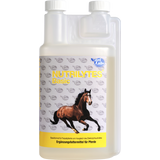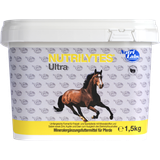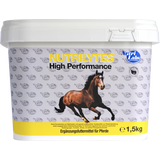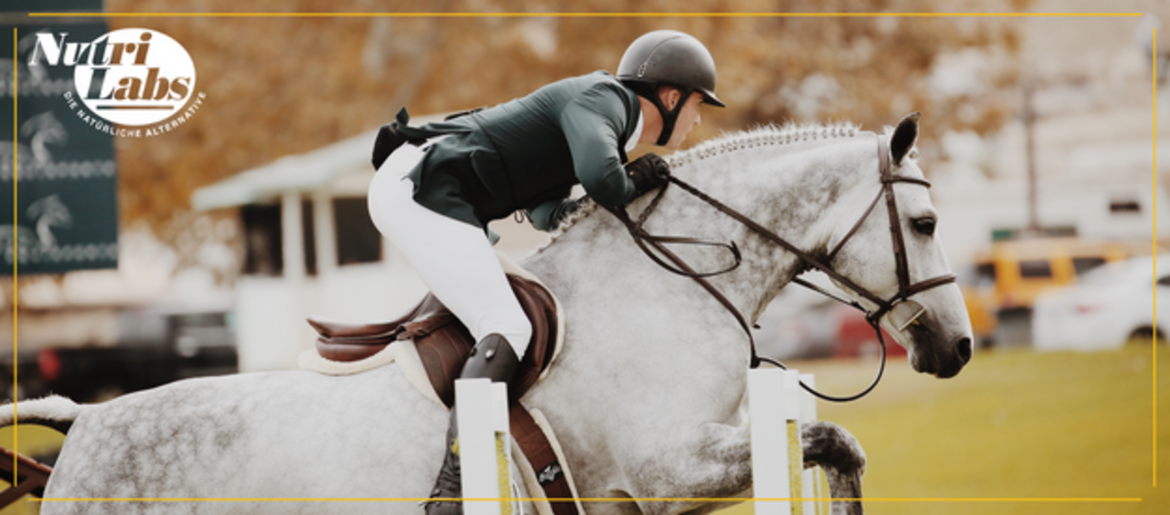Electrolytes - As Simple As They Are Complex
Feeding electrolytes correctly is a science in itself, as they should be available to the horse exactly when it needs them.
The supply of electrolytes is a major issue for both competition and leisure riders (especially in the summer). The vital electrolytes are inorganic minerals that the body cannot produce itself, meaning that they must be given additionally. They serve to regulate the balance of fluids in the horse's body, are responsible for the horse's feeling of thirst, and regulate the distribution of fluids in the body cells. They are lost through heavy sweating and, if they are not replenished, this can lead to prolonged recovery times, fatigue, lower performance and fitness, as well as a higher risk of injury.
Electrolytes are responsible for the correct pH level in the blood so an undersupply can certainly have consequences for the horse, such as for the muscles. If electrolyte deficiency causes the blood to thicken, the muscles are no longer properly supplied with blood and acid can build up. Painful tension and cramps, even exertional rhabdomyolysis, can result. Electrolytes are also responsible for the coordination of important metabolic processes, send signals to muscle and nerve cells, and can transmit electrical impulses.
CAUTION: The horse often indicates the loss of electrolytes by refusing water. It instinctively senses that the intake of water would further decrease the electrolyte concentration in its body. This means that electrolytes need to be administered before water intake.
The most common reason for electrolyte deficiency is severe fluid loss through sweating, triggered by stress, exertion, or during transport. Other causes can be diseases such as colic or diarrhoea and - in rarer cases - inadequate roughage or feed. Symptoms such as exhaustion or reduced performance also indicate an insufficient supply of minerals. Electrolyte deficiency can also result in circulatory problems easily detected by pale mucous membranes, In breeding, the mating process in stallions and the birthing process in mares are particularly sweaty and can lead to an undersupply.
High-quality feed as a basis, topped up by an individual supply of electrolytes
A balanced diet with high-quality feed, especially hay, is a good basis for the supply of electrolytes. Mineral requirements that cannot be covered by roughage must be compensated by means of dietary supplements. While a basic supply is usually sufficient for leisure horses, (performance) athletes usually require electrolyte products with a higher dose. It is also important to have a plentiful supply of fresh water, since electrolytes and water are always connected.
But why does the horse sweat in the first place? Well, sweat is the best way to thermoregulate the horse's body during exertion; it acts like an air conditioner. Sweat is composed of water, electrolytes, and proteins. The more a horse sweats, the higher the electrolyte concentration in the blood. Protein excretion is seen as a white foam that appears between the buttocks or under the saddle blanket during great exertion, as well as on the head under the bridle.
Performance, temperature, and humidity can result in considerable fluid loss - and therefore also electrolyte loss. A careful administration of electrolytes at the right time is needed to compensate for this. The best time of day is the evening, when the work is done and the stall is quiet. Choosing the evening before an active day ensures a relaxed absorption of electrolytes with the concentrate feed. The horse recognises best how much water it ńeeds to keep its electrolyte levels balanced when it is at rest.
NOTE: Electrolytes should not be administered under stress, during transport, or immediately before or after exercise.
NutriLabs has developed three products to ensure every horse can be offered the optimal dose of electrolytes, whether leisure horse or top athlete: Nutrilytes® Basic, Nutrilytes® Ultra, and Nutrilytes® High Performance. Nutrilytes® supports your horse's performance and helps keep it healthy.
Nutrilytes® Basic is designed for leisure horses that perform light to medium work. It is suitable for daily feeding and has a high sodium chloride content. Nutrilytes® Basic and a balanced diet get every horse off to a great start.
Nutrilytes® Ultra Pellets were developed for leisure and sport horses with an increased need for electrolytes. Heavy sweating also causes horses to lose trace elements, so Nutrilytes® Ultra also includes the necessary salts, as well as zinc, copper, and iron
Nutrilytes® High Performance is the ideal electrolyte product for horses that have to perform at their best. Its broad spectrum of important ingredients makes it the perfect option for competition horses.
Nutrilytes® Ultra and High Performance are fed in pellet form, making feeding easy by ensuring maximum acceptance by the horse. It is also ideal for administering a high amount of electrolytes. The pellets are even suitable for horses with sensitive stomachs.
Author: Andrea Kerssenbrock
Related products
-
 4.0 (1)
4.0 (1)NutriLabs NUTRILYTES BASIC Liquid, 1 l
- For leisure horses
- For light to medium exertion
- Ideal for daily feeding, especially in summer
€ 24,49 (€ 24,49 / l)Delivery by April 23
-
 5.0 (1)
5.0 (1)NutriLabs NUTRILYTES ULTRA Pellets, 1,50 kg
- For leisure and sport horses
- Easily digestible pellets - high acceptance
- With zinc, copper, and iron
€ 44,99 (€ 29,99 / kg)Delivery by April 23
-

NutriLabs NUTRILYTES HIGH PERFORMANCE Pellets, 1,50 kg
- For very strenuous exercise, transportation, and stress
- With amino acids, vitamins, & antioxidants
- Increases motivation
€ 68,99 (€ 45,99 / kg)Delivery by April 23
